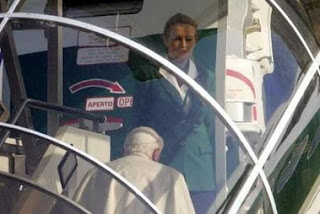Jesus healing the possessed.

I think with the release of this book (which I got yesterday and read straight through) the pope is positioning himself to be the St. Thomas Aquinas of our age. How or why do I say this? Because like St. Thomas who answered the objections to the Faith in his day, this pope is doing the same.
A few months ago someone asked me what book I would recommend that they give to their adult children who no longer practiced the faith, without hesitation I named this book as the one. At the time I had only read some excerpts available online from Germany and Italy. It was an act of faith then, now that I have the book I know that my recommendation was justified.
This is a great book, magisterial (even though the pope doesn't want it thought of in that way). It is not just another book about Jesus, it a revolutionary book about Jesus...in that it recaptures why people have had their lives changed by their belief in Jesus for over 2,000 years.
What makes this book so special? It is like a modern Summa (those who know St. Thomas Aquinas will understand me here) in that it answers modern questions of doubt, skepticism and even inquiry on not only who Jesus is, but why Jesus is the most important person anyone has ever or can ever know.
The pope's methodology is to take a scene from the Bible, like the Lord's baptism and then to draw on that scene from the entire Bible, to show what modern scholarship has done to help us to understand the historical context of the scene, tell us how the early Church fathers interpreted the scene, how would it have been viewed in Judaism (he uses the reflections of a Rabbi when discussing the Sermon on the Mount) and then to give the reader the meaning of this event for them. Along the way he answers questions to the many objections modern people bring to their encounter with Jesus.
As someone who has studied theology for a number of years and been exposed to every screwball theology out there, I found this book to be a corrective lens to refocus and correct my vision of who Jesus is and what following him means. What impresses me (and I'm not easily impressed) is that the Pope takes on the "screwball (my term, not his)" theologies in such a way as to making them seem silly (although he is incredibly charitable in his approach).
This book will have a great effect on renewing the Church and centering it on an image of Christ that is Biblical and credible, erasing years of poor and faulty preaching and teaching.
If you are not Catholic, but a Christian you will love this book too. In fact I predict you will be come a big fan of Joseph Ratzinger and will want to read his many published works to encounter someone rooted in Scripture and conversant with modern attacks on it. If you are a non Christian I think you will find in the book an excellent introduction to what Christians believe about the God-man from Nazareth. To all you parents out there who sent your kids to Catholic schools and now wish they would practice their faith, give them this book and reintroduce them to Jesus of Nazareth.
 ...said Cubs manager Lou Piniella.
...said Cubs manager Lou Piniella.

















